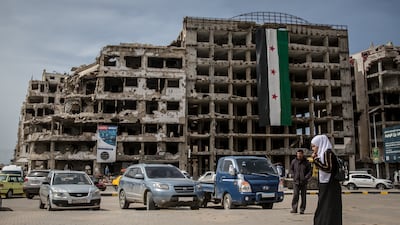Gunmen have killed and abducted 14 members of Syria's Alawite minority in the space of 72 hours, it was revealed on Sunday, as security forces cordoned off neighbourhoods to prevent further attacks.
The killings are the latest outbreak of sectarian violence in Sunni-majority Syria targeting mainly Alawites, who lost out when forces led by Hayat Tahrir Al Sham (HTS) removed Bashar Al Assad late last year. The HTS ascendancy has ended Alawite control of the security forces and changed the region's dynamics, depriving Shiite Iran of a forward position and cutting off a supply line for Hezbollah.
Members of the Al Fawara tribe entered Alawite areas of Homs on motorcycles on Thursday and Friday, carrying AK-47 rifles and abducting men from streets and businesses, according to residents and members of the Alawite sect. Their bodies were found on the outskirts of the city over the past 48 hours.
Ahmad Al Zuaiter, a former Alawite political prisoner who was detained several times for opposing the Assad regime, said the bloodshed started after security forces entered Al Bayada, a Sunni neighbourhood, looking for a wanted man from Al Fawara. The tribe clashed with security forces, then mounted the incursions into Alawite neighbourhoods.
"The Alawites had nothing to do with it," Mr Al Zuaiter told The National. The gunmen are believed to have entered the Zahra and Nuzha districts and other neighbourhoods in Homs.

Mustafa Al Mroueh, a Sunni figure who has been working on initiatives to halt revenge killings in Homs, said security forces had cordoned off Alawite neighbourhoods but could not prevent infiltrations. "Homs is too intertwined and those who wanted to harm the Alawites managed to do so," he said.
The city is home to Syria's main oil refinery and lies on a motorway leading from the capital Damascus to the Mediterranean coast. It was overwhelmingly Sunni before Hafez Al Assad, father of ousted president Bashar, took power in 1970.
Assad cousin
Rami Makhlouf, a billionaire cousin of Bashar Al Assad who was stripped of his assets after falling out with the former president, described the latest killings in Homs as a massacre.
He said in a social media post that he was working with Alawite former army commander Suhail Al Hassan to set up new forces to “defend ourselves against those coming to slaughter us”. He said the supposed force “does not want to assault anyone” and that a “new epoch should begin in Syria, based on “love and forgiveness”.
Mr Makhlouf, whose whereabouts are unknown, also called on Russia to “include in its care” the coastal region of Syria, the ancestral heartland of the Alawites.
Alawite dominance
The elder Mr Al Assad offered positions in the bureaucracy and state-owned enterprises disproportionately to Alawites, attracting members of the sect to Homs and other urban centres.

Alawite control over the security apparatus also deepened, with the sect underpinning the officer class. During the civil war that began in 2011, Alawites formed the core of the Shabbiha, paramilitary forces loyal to the Assad regime and blamed for some of the bloodiest killings of Sunni civilians.
In the past four months, HTS and militias allied with the group have mounted incursions into Alawite areas, mainly in Homs and the coast, in a hunt officially described as targeting regime remnants.
Sectarian bloodshed in these areas quickly followed and several hundred Alawites were killed, many randomly with no established link to the former regime, activists say. On March 7 and 8, at least 1,300 people were killed, mostly Alawite civilians along Syria's coast, amid incursions by HTS-led forces that were met by ambushes.
UN envoy to Syria Geir Pedersen told the Security Council on Friday that a "sense of grievance still exists" among both Assad loyalists and supporters of the new regime. He described it as a "deep feeling of exclusion from the political process and the public sector on one side, but also profound grievances towards people associated with the former regime on the other".
"Every step towards establishing the rule of law – and moving on transitional justice – will help reassure all components of the Syrian society," Mr Pedersen said.




